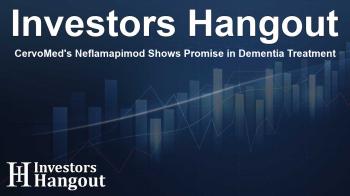CervoMed's Neflamapimod Shows Promise in Dementia Treatment

Exciting Progress in Dementia Research by CervoMed
CervoMed Inc., a clinical-stage company dedicated to developing innovative treatments for age-related neurologic disorders, has unveiled encouraging results from the 32-week Extension phase of its Phase 2b RewinD-LB trial. Focusing on the treatment of Dementia with Lewy Bodies (DLB), the findings reveal that oral neflamapimod is making significant strides in combating clinical progression in patients.
Key Findings from the RewinD-LB Trial
Sparking great interest within the scientific community, the data showed that patients receiving neflamapimod demonstrated a remarkable 54% reduction in the risk of clinically significant worsening on the Clinical Dementia Rating Sum of Boxes (CDR-SB) compared to those in the control group at the 32-week mark (p=0.0037). Notably, this number increased to 64% (p=0.0001) for individuals displaying minimal Alzheimer’s Disease (AD) co-pathology.
Moreover, plasma levels of glial fibrillary acidic protein (GFAP), a crucial biomarker for neurodegeneration, significantly decreased among the subjects treated with neflamapimod throughout the Extension phase. This correlational evidence highlights the drug's potential to not only slow clinical progression but also mitigate neurodegenerative processes.
CervoMed's Commitment to DLB Treatment
John Alam, MD, Co-Principal Investigator of the trial and CEO of CervoMed, expressed enthusiasm about the trial results. He stated, "The positive outcomes from the trial emphasize neflamapimod's capabilities in slowing down clinical deterioration, validated by both the CDR-SB results and multifaceted improvements in GFAP levels. Our goal remains focused on developing effective treatment options for individuals suffering from DLB, and these preliminary results bolster our confidence as we approach clinical trials with the U.S. Food and Drug Administration in the future."
Understanding the Impact of Neflamapimod
Dr. Lawrence S. Honig, a Professor of Neurology at Columbia University, also commented on the findings, noting that a reduction greater than 50% in the risk of clinical progression is likely to yield noticeable benefits in daily functioning for patients and caregivers alike. Since DLB represents a challenging disease that combines both cognitive and movement impairments, achieving such improvements through effective treatments speaks volumes about neflamapimod's potential in this realm.
Detailed Examination of New Capsules
In the RewinD-LB trial, researchers introduced a new batch of neflamapimod capsules that provided the expected plasma exposures and demonstrated a statistically significant clinical benefit. Compared to the older batch, which resulted in lower efficacy, these New Capsules have become vital in evaluating the clinical responses as the trial progresses.
Clinical Progression Analysis
With significant findings from the Kaplan-Meier time-to-progression analysis, the clinical data has shown that patients on the New Capsules experience notable improvements. The analysis indicated that those with ptau181 levels below 2.2 pg/mL received additional benefits, emphasizing the importance of patient stratification based on biomarker levels.
A Closer Look at GFAP Levels
The Company further revealed that GFAP plasma levels exhibited a significant drop at the 32-week mark among patients receiving New Capsules over the entire duration. With a mean change of -18.4 ± 4.0 pg/mL for all trial participants and an even more pronounced average of -21.2 ± 4.4 pg/mL in those with reduced ptau181 levels, the evidence suggests that neflamapimod plays a crucial role in addressing neurodegeneration associated with DLB.
Next Steps and Future Directions
CervoMed's pathway forward involves discussions surrounding the initiation of Phase 3 trials while continuing to monitor safety and efficacy. With no new safety signals identified during the trial's Extension phase, the investigational therapy appears promising.
Frequently Asked Questions
What is CervoMed focusing on in its clinical research?
CervoMed is focused on developing treatments for age-related neurologic disorders, particularly Dementia with Lewy Bodies, utilizing their investigational drug, neflamapimod.
What were the main results from the RewinD-LB trial?
The trial indicated a 54% reduction in clinical worsening among patients treated with neflamapimod, improving to 64% for those with minimal Alzheimer's co-pathology.
How does neflamapimod affect neurodegenerative biomarkers?
Patients receiving neflamapimod showed significant reductions in GFAP plasma levels, indicating a positive effect on neurodegenerative biomarkers linked to DLB.
What is CervoMed's next step following these results?
The company aims to advance into Phase 3 trials and will engage with regulatory bodies to discuss the trial design based on these promising results.
How can interested parties learn more about CervoMed's findings?
Additional details can be found on CervoMed's Investor Relations website, where presentations and announcements related to the RewinD-LB trial are made available.
About The Author
Contact Henry Turner privately here. Or send an email with ATTN: Henry Turner as the subject to contact@investorshangout.com.
About Investors Hangout
Investors Hangout is a leading online stock forum for financial discussion and learning, offering a wide range of free tools and resources. It draws in traders of all levels, who exchange market knowledge, investigate trading tactics, and keep an eye on industry developments in real time. Featuring financial articles, stock message boards, quotes, charts, company profiles, and live news updates. Through cooperative learning and a wealth of informational resources, it helps users from novices creating their first portfolios to experts honing their techniques. Join Investors Hangout today: https://investorshangout.com/
The content of this article is based on factual, publicly available information and does not represent legal, financial, or investment advice. Investors Hangout does not offer financial advice, and the author is not a licensed financial advisor. Consult a qualified advisor before making any financial or investment decisions based on this article. This article should not be considered advice to purchase, sell, or hold any securities or other investments. If any of the material provided here is inaccurate, please contact us for corrections.

